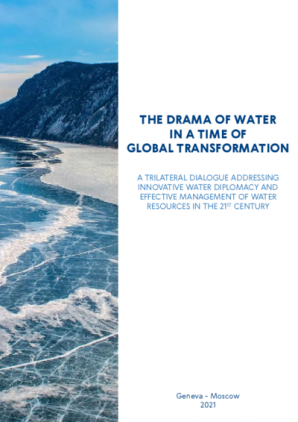SIC ICWC PARTICIPATES IN THE TRIPARTITE DIALOGUE ON INNOVATIVE TOOLS OF WATER DIPLOMACY IN THE XXI CENTURY
On June 22, 2021 the «The Drama of Water in a Time of Global Transformation» was presented. 36 eminent Russian and foreign experts were engaged in the publication as part of cooperation between the Geneva Water Hub and the International Association of the Lake Regions.

Jurg Lauber, Permanent Representative of Switzerland to the UN and other International Organizations in Geneva, Alexander Alimov, Deputy Permanent Representative of the Russian Federation to the UN and other International Organizations in Geneva, Francois Manger, Director General of the Geneva Water Hub, and Alexander Timchenko, Director General of the International Association of the Lake Regions took part in the event
At the high-level panel, speakers shared their views on the value of the tripartite dialogue and the resulting publication for their work. Those included Danilo Turk, Chairman of the Global High-Level Panel on Water and Peace, Vyacheslav Fetisov, First Deputy Chairman of the State Duma Committee on Physical Culture, Sport, Tourism and Youth Affairs, Dmitry Mariyasin, Deputy Executive Secretary of UNECE, Baklanov Andrey Gennadyevich, Deputy Chairman of the Association of Russian Diplomats, Professor of National Research University Higher School of Economics, and Guy Bonwen, Swiss Special Envoy for Water in Central Asia, Swiss Agency for Development and Cooperation.
Anton Kulbachevsky, Head of Department of Environmental Management and Nature Protection of the Moscow Government, Tumun Tsydypov, First Deputy General Director of the Baikal Region Development Center, Dinara Ziganshina, Deputy Director of the SIC ICWC, Alexei Arnautov, Director of Innovative Projects, EN+, Baikal International Water Resources Centre, and Hasmik Barseghyan, President of the 15th European Youth Parliament for Water took the floor at the Panel of Experts.
D.R. Ziganshina focused on the two issues. First, she stressed the need for developing both engineering and socio-humanitarian aspects of water science. The new UNESCO Science Report launched in early June underlined that from 2014 to 2018 the funding for science increased by 19 per cent and the number of scientists rose by 14 per cent worldwide, but those numbers have fallen in Russia and Central Asia. Thus, science expenditures accounted for 1.07 percent of Russian GDP in 2014 and 0.99 percent in 2018. As to the Central Asian countries, this indicator dropped from 0.17 percent to 0.12 percent of GDP in four years.
Second, researchers and practitioners from around the world need to work more closely together and collaborate to ensure water security. Since 2008, water experts have collaborated within the Eastern Europe, Caucasus and Central Asia Network of Water Management Organizations (EECCA NWO) supported by UNECE through the Russian Fund. The funding has ended this year, but it is hoped that the Russian Fund would offer further opportunity to maintain this important platform for sharing experience and conducting joint research. Among the outputs of the Network was the establishment of an Expert Platform for water security, sustainable development and future studies in the EECCA Region. Experts of the platform analyzed the statements made at the general debate of the UN General Assembly by the EECCA countries over 30 years. The analysis showed that water issues are not addressed from the main world tribune as frequently and vigorously as desired, except for the Central Asian countries. All country reports can be found on: cawater-info.net/expert-platform/.
More information about the event is available on www.genevawaterhub.org/news/new-date-launching-event-drama-water-time-global-transformation
|